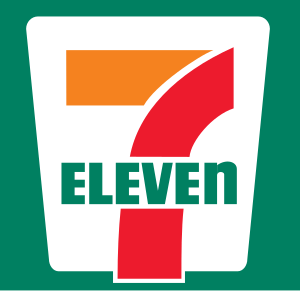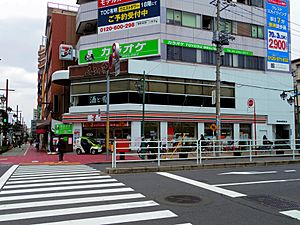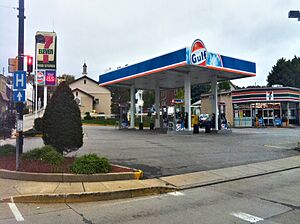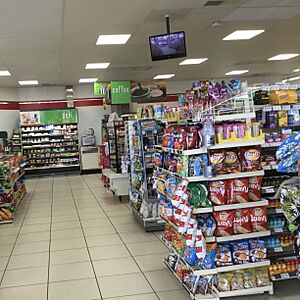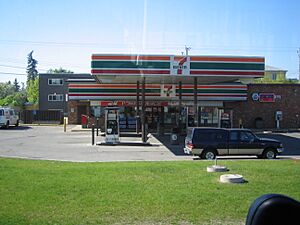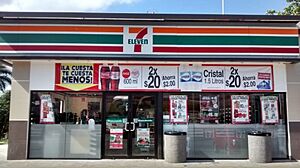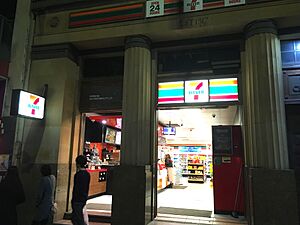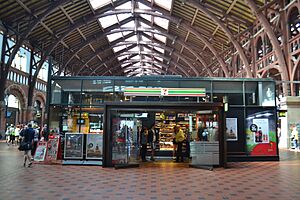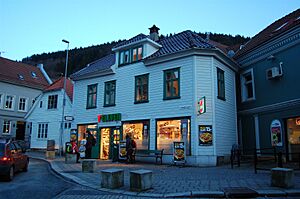7-Eleven facts for kids
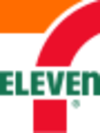
Logo since 2021
|
|
|
Formerly
|
|
|---|---|
| Division | |
| Industry | Retail (convenience stores) Franchising |
| Founded | 1927 (as Southland Ice Company) |
| Founder | Joe C. Thompson |
| Headquarters | 3200 Hackberry Road,
,
United States
|
|
Number of locations
|
85,000 stores (2024) |
|
Area served
|
|
|
Key people
|
|
| Products | Convenience foods and beverages, gasoline |
|
Number of employees
|
135,332 |
| Subsidiaries |
|
7-Eleven, Inc. is an American chain of convenience stores with its main office in Irving, Texas. It is owned by the Japanese company Seven & I Holdings.
The company started in 1927 in Dallas, Texas, as the Southland Ice Company. At first, it was just a storefront at an ice house where people could buy blocks of ice to keep their food cold. Soon, it started selling milk, bread, and eggs. This was a new idea because it saved people from traveling to a big grocery store for just a few items.
Between 1928 and 1946, the stores were called Tote'm Stores. The name was changed to 7-Eleven in 1946 to let customers know about the stores' new, longer hours: 7:00 a.m. to 11:00 p.m. This was very unusual at the time.
Today, 7-Eleven has about 85,000 stores in 20 different countries. Many of these stores are open 24 hours a day, 7 days a week. In the United States, 7-Eleven also owns the Speedway and Stripes Convenience Stores chains.
Contents
The Story Behind the Name
The company's first stores were called "Tote'm Stores" because customers would "tote" or carry away their items. Some of the first stores even had large, carved totem poles out front to attract customers.
In 1946, the name was changed to "7-Eleven" to advertise the new hours, which were from 7:00 a.m. to 11:00 p.m., seven days a week.
Have you ever noticed the logo? Since 1968, the "n" in "Eleven" has been lowercase. The wife of the company's president in the 1960s suggested the change. She thought that having all capital letters looked a little "aggressive" and that a lowercase 'n' would make the logo seem more friendly and "graceful."
History
Early Years
In 1927, an employee of the Southland Ice Company, John Jefferson Green, started selling basic food items like eggs, milk, and bread from the ice houses. One of the company's founders, Joe C. Thompson Sr., realized that these small stores were very convenient for customers. He bought the Southland Ice Company and opened more locations around Dallas.
In 1928, a store manager put a real totem pole from Alaska in front of her store. People loved it, and soon, totem poles were placed at every store. The stores were then named "Tote'm Stores." In the same year, some stores started selling gasoline.
Hard Times and New Ideas
During the Great Depression in the 1930s, the company had serious money problems and almost went out of business. But with the help of a Dallas banker, the company was able to survive.
After World War II, the company grew again. In 1946, the stores were renamed 7-Eleven to show off their new, long hours. In 1963, a store in Austin, Texas, stayed open 24 hours to meet customer demand. This was so successful that soon many other 7-Eleven stores were open all day and all night.
Growing Bigger
In the 1960s, 7-Eleven started to allow people to open their own stores through franchising. This helped the company grow much faster.
In the late 1980s, the company faced money troubles again. To save the business, a Japanese company named Ito-Yokado, which already ran 7-Eleven stores in Japan, bought a large part of the company. By 2005, Ito-Yokado's parent company, Seven & I Holdings, owned all of 7-Eleven, Inc.
In 2020, 7-Eleven bought the Speedway chain of convenience stores and gas stations for $21 billion, adding thousands of new locations across the United States.
Cool Products and Famous Drinks
7-Eleven is famous for some of its unique products, especially its drinks.
- Slurpee: A slushy, frozen soft drink that comes in many different flavors. It was first introduced in 1965.
- Big Gulp: These are extra-large fountain drinks, first sold in 1976. 7-Eleven is known for its very large cup sizes.
Besides drinks, 7-Eleven stores sell coffee, fresh sandwiches, salads, donuts, and other hot foods. They also sell their own brand of snacks and drinks called 7-Select.
7-Eleven Around the World
7-Eleven is a global company with stores in many countries. The look and feel of the stores can be different depending on where you are.
Japan
Japan has more 7-Eleven stores than any other country in the world. With over 21,000 stores, about one-quarter of all 7-Elevens are in Japan. The stores there sell a wide variety of items, including fresh meals, snacks, and even things like concert tickets. The automated teller machines (ATMs) in Japanese 7-Eleven stores are popular with tourists because they accept bank cards from other countries.
North America
United States
There are thousands of 7-Eleven stores across the United States. On July 11th (7/11), the company celebrates "7-Eleven Day" by giving away free small Slurpees to customers. For many years, the 7-Eleven stores in Oklahoma were run separately and had different products. For example, they called the Slurpee an "Icy Drink." In 2020, the main company bought these stores, so now they are all the same.
Canada
The first 7-Eleven in Canada opened in 1969. The city of Winnipeg, Manitoba, is famous for being the "Slurpee Capital of the World" because its residents drink more Slurpees than people in any other city.
Mexico
In Mexico, the first store opened in 1976 and was called "Super 7." The name was changed to 7-Eleven in 1995. Today, there are over 1,800 stores in the country.
Australia
The first 7-Eleven in Australia opened in 1977. In 2015, news reports showed that some Australian stores were not paying their workers the correct amount. 7-Eleven's main office set up a special group to fix the problem and paid back the money that was owed to the workers.
Europe
7-Eleven stores are also found in several European countries, including Denmark, Norway, and Sweden. The store located inside the main train station in Copenhagen, Denmark, is one of the most successful 7-Eleven stores in the world.
Images for kids
See also
 In Spanish: 7-Eleven para niños
In Spanish: 7-Eleven para niños
- List of convenience stores
- UtoteM
- R-kioski


